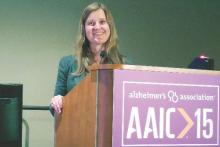WASHINGTON – A 7-minute screening tool nearly doubled the rate at which primary care physicians could identify elderly patients in their practices with dementia in a German study involving more than 6,800 community-dwelling people.
“Screening can considerably improve the recognition of dementia in primary care,” Dr. Tilly Eichler said at the Alzheimer’s Association International Conference 2015. But she cautioned that further research needs to be done to determine the best ways to identify the specific type of dementia a patient has, and must also follow patients long term to assess the benefits and risks from a more aggressive approach to dementia diagnosis in community-dwelling primary care patients.
The majority of patients identified with dementia in primary care practices had an unspecified cause for their dementia, noted Dr. Eichler, a researcher with the German Center for Neurodegenerative Diseases in Greifswald, Germany.
Dr. Eichler and her associates arranged for 136 German primary care physicians to administer the DemTect screening tool (Int J Geriatr Psychiatry. 2004 Feb;19(2):136-43), a five-part test that takes about 7 minutes to administer, to screen 6,838 community dwellers aged 70 years or older as part of the DelpHi-MV (Dementia: Life- and Person-Centered Help in Mecklenburg–Western Pomerania) study. The DemTect test identified 1,166 people (17%) with potential dementia based on scoring 8 or less on the screening tool. After obtaining informed consent, the researchers performed a detailed assessment of 468 of that population. The 468 people flagged by screening as possibly having dementia were all 70-79 years old, 60% were women, and half of them lived alone.
Medical records for this subgroup showed that 179 (38%) had already been diagnosed with dementia prior to screening based on their scores on the Mini-Mental State Examination (MMSE). Among the remaining 289 people identified by their DemTect score as potentially having dementia, MMSE testing identified another 171 people with dementia, increasing the total of this subgroup diagnosed with dementia by a relative 96%, compared with the 179 patients who had been identified with dementia prior to screening.
Two-thirds of the patients with newly diagnosed dementia had an unspecified form while 18% had Alzheimer’s disease, 14% had vascular dementia, and the remainder had other forms of dementia, Dr. Eichler said. Combining the newly identified 171 people with dementia and the 179 people previously diagnosed resulted in a total of 350 people diagnosed with definite dementia by the MMSE, 75% of the 468 identified as potentially having dementia based on their scores with the DemTect screening tool.
Dr. Eichler had no relevant financial disclosures.
On Twitter@mitchelzoler


